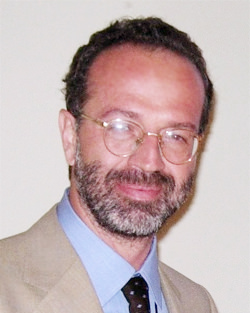
Main present positions
- - Director Palliative Care, Pain Therapy and Rehabilitation Fondazione IRCCS National Cancer Institute, Milano Italy
- - Vice President European Association for Palliative Care Research Network (EAPC - RN)
- - Professor of palliative medicine Norwegian University of Science and Technology (NTNU), Trondheim
- - Chair elect Special interest group on cancer pain International Association for the Study of Pain (IASP)
Bio-sketch
Augusto Caraceni was born in Milan on August, the 8th 1960, where he lives with his wife and two sons. After graduating from medical school at the Università degli Studi di Milano in 1985, he was board certified in Clinical Neurophysiology (1988) and in Neurology (1993) at the Università di Pavia. While training in pain therapy and in palliative care at the National Cancer Institute of Milan in 1986 with Vittorio Ventafridda, Dr Caraceni participated in the WHO program to test and disseminate the WHO ladder for cancer pain relief. He was also a Clinical Fellow in Neurology and Palliative care at Memorial Sloan-Kettering Cancer Center, in New York in 1994.
Main previous office was the vicepresidency of the European Association of Palliative Care 2006-2010
His clinical and research experience include the palliative treatment of advanced cancer, neurological complications of cancer, cancer pain classification assessment and treatment with particular attention to opioid analgesics, and symptom control with a special interest in delirium.
He is the author of 125 scientific articles in peer reviewed indexed journals, and of more than 80 other publications. With Luigi Grassi, he published the monographic book, “Delirium: acute confusional states in palliative medicine”, Oxford University Press 2nd ed 2011.
Milan September 1st 2013
Symposium: Cancer pain management ‒ Up To Date
The European Association for Palliative Care (EAPC) Guidelines for Cancer Pain Development and Update Strategy
Abstract
The EAPC guidelines on the use of opioids for cancer pain have been developed following the success of the WHO ladder for cancer pain relief in the 80s. The focus on the relief of pain in uncurable cancer is a cornerstone of the professional competence of palliative care as a clinical field in medicine. The EAPC opiod guidelines were one of the first tasks undertaken by the EAPC Research Network lead by Geoffrey Hanks and Franco De Conno. Since 1996, EAPC published 3 editions of its recommendations on the use of morphine and other opioids for cancer pain. The latest release, published in 2012, was based on an international expert panel funded by the 6th framework of the EU and adopted the GRADE system for presenting a number of evidence based recommendations which can be seen as the state of the art of this crucial aspect of patient care. Several international research groups and clinical stakeholders were involved and specific systematic literature reviews were done and published. The recommendations on opioids cover 16 topics, identifying the role of step II and step III opioids, the choice of first line opiod for severe cancer pain, opioid titration and use of rescue medications, role of methadone and transdermal opioids, the use of adjuvant drugs and NSAIDs in addition to opioids, use of parenteral and spinal routes of administration, the rationale of managing opiod side effects and their use in patients with renal failure. This whole effort aims at offering all professional and non professional users a common ground of discussion to establish our practices and a general framework to address our research priorities in this field which is largely overlooked by most national, international, private and public agencies and institutions. For this very reason the EAPC research network and the European Palliative Care Research Center (PRC) acknowledge this as a continuous, ongoing commitment. The Cancer pain guideline steering group is presently working on revising and updating the next version of the EAPC guidelines, which will broaden their scope beyond the use of opioids to the overall management of cancer pain, including assessment and classification, use of non opioid analgesics (NSAIDs, Ketamine, cannabinoids) opioids not previously included (tapentadol), the role of palliative cancer therapies in controlling pain (RT, Chemotherapy, bisphodphonates, denosumab) the role of invasive anesthesiological procedures. The EAPC commitment in addressing the needs of patients with pain due to uncurable cancer is an opportunity to emphasize the international recognition of palliative care and it is open to worldwide international collaboration.
